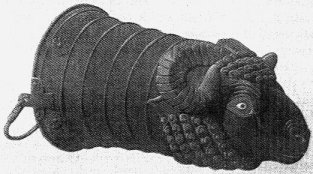
Can we know what was eaten at a feast 3000 years ago? Yes, we can!
In 1999 archeologists
discovered in Minor Asia, in land of ancient Frigia, a tomb full of precious objects of any kind,
pearls, noble stones, expensive materials and subtle bronze dishes. The richness
of the funeral indicated at high rank of the dead man, and place and age
of the tomb pointed at similarity with ancient Greek cultures. Almost, almost
king Midas' tomb.

On the bottom of bronze cups, in shape of sheep's head, there were some remains, almost unvisible with naked eye. The rests from the funeral feast? However, there was too little (and slightly out of date!) to taste it. But the appetite grows!
Luckily there is a contemporary science. It will tell you (and to the Police), not only how much you have drink but also what kind of alcohol! Different techniques used to find out what was eaten during the king's Midas funeral feast are common called spectroscopy (from Greek word spectrum it means a ghost).
It was a rich feast,
that of Midas at his fineral: at the bottoms of the over 100 cups and plates
the scientists found 16 different kinds of alcohols: a good quality wine, barley beer and
fermented bee's honey. At the bottom of the
dishes there were found at least 14 kinds of meat mainly sheep and goat. Meat
first was grilled, and then detached from the bones, next mixed with Mediterranean
herbs and spieces. Wines and beer were mixed in different proportions and
served in elegant cups. Remains was loaded for king's Midas road through Styx river.
Well, well, such a funeral feast is enough to take a place in mythology forever!
Click here to discover how were examined remains from king's Midas funeral fest.